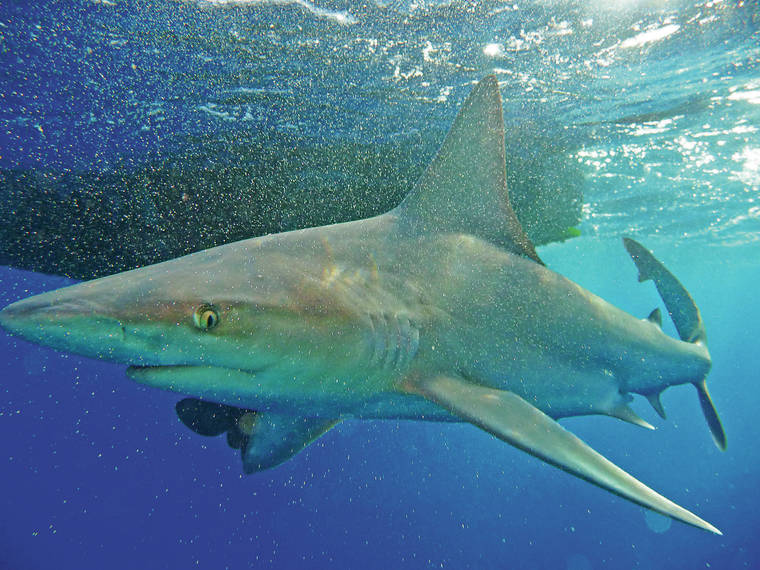Two bills introduced during this year’s legislative session will add protections for sharks in state waters.
People who “knowingly capture, possess, abuse, or entangle” a shark, whether it is dead or alive, or kill a shark within Hawaii state waters would be subject to a misdemeanor and fine if the language in Senate Bill 2717 or House Bill 2414 gets signed into law.
Rep. Ryan Yamane (D,
Mililani-Waipio-Waikele), chairman of the Water, Land and Hawaiian Affairs Committee,also supports language in HB 2414 that would create a 150-foot “zone of protection” around all sharks.
“We’re also going to put a zone around sharks so you cannot harass sharks,”
Yamane said. “If you are going to go out there to look for sharks or watch sharks, you’ve got to make sure you’re outside that 150-foot zone.”
He likened the zone to federal protections for humpback whales, which prohibit people without permits from approaching within 100 yards Opens in a new tab. He said chumming water to attract sharks would be considered a form of harassment.
The International Union for Conservation of Nature’s Red List of Threatened Species, using data up to last year, reported that anywhere from 18% to 57% of extant species of sharks, rays and chimeras are considered threatened — they have been assessed as vulnerable, endangered or critically endangered.
Information from the state Department of Land and Natural Resources shows that 12 of the 41 shark species in Hawaii fall under one of those three threatened categories. Eleven are listed as vulnerable and one as
endangered.
Last year House Bill 808 sought to establish the misdemeanor and associated charges found in SB 2717 and HB 2414. Those fines increase substantially for each subsequent offense: First-time offenders would be fined $500; second-time
offenders would be fined $2,000; and anyone who is caught three or more times would be charged $10,000 for each offense.
HB 808 had also included all rays. It passed, but not before sharks were removed completely and abruptly in the 11th hour during the fast-paced end of the legislative session, in which senators and representatives have to work out any disagreements in the language of bills.
Yamane said sharks were removed because of concerns from researchers from the University of Hawaii
regarding permitting, enforcement and possible implications for those studying them.
“In conference you don’t have time to work on that. … We don’t want to insert new language that, you know, can be criticized as the bill being significantly different, but that’s the legislative process,” he said.
The players involved in last year’s bill are shaping up to be the same as those in this year’s bills. Most environmental organizations along with the public who provided testimony support the bills, citing threats to global shark populations along with the cultural significance of Hawaii’s sharks, or mano in Hawaiian.
Last year the minority against HB 808 included shark researchers and fishers in the state. There have so far been only two testimonies in opposition to this year’s bills. Kim Holland, a shark researcher and founder of the Shark Research Group at the University of Hawaii at Manoa’s Hawaii Institute of Marine
Biology, offered testimonies both last year and this year.
Holland’s testimony for HB 2414 said, “Hawaii’s coastal sharks are not being impacted by people ‘knowingly fishing or harassing’ them. Therefore, this bill will have no impact on the health of shark populations in Hawaii state waters.”
He said the bills would curtail “scientific research and educational activities by imposing unnecessary administrative hurdles that can change unpredictably” and could be “notoriously burdensome, subjective and slow to be issued.”
Holland declined to comment for this story.
Yamane and supporters of the bills intended to ensure that the measures would not target anyone who accidentally encounters, does legitimate research with or participates in cultural activities involving sharks.
Proponents say fishers would not be targeted, either.
“The intent … is not to go after fishers who, in the course of lawful fishing, accidentally catch a shark and release the shark — that’s exactly what they should do, what we want them to do,” said Inga Gibson, who spoke as a policy consultant for For the Fishes, a nonprofit that primarily focuses on the protection of coral reef habitat and wild fish populations.
Gibson said the bills would target people who intentionally target sharks.
Globally, interactions between fishers and sharks — whether intentional or accidental — have been acknowledged as overwhelming threats to shark populations Opens in a new tab, according to the World Wildlife Fund.
There are currently no targeted shark fisheries in Hawaii. In 2010 Hawaii became the first state in the U.S. to ban possessing, selling, trading or distributing shark fins Opens in a new tab.

